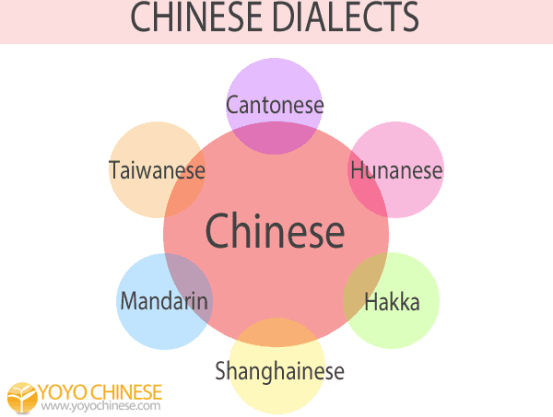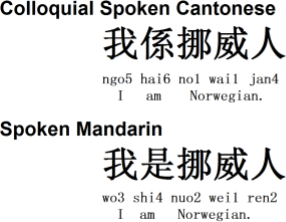by Yang Yang
If you want to learn to speak Chinese, one of the first things you need to do is decide between Mandarin and Cantonese. At Learn Mandarin Now, it is our mission to help you learn Mandarin Chinese with a variety of articles, tips, and advice.
If you are still trying to decide, here are some factors that you may want to consider.
You've probably noticed that the sounds of Cantonese and Mandarin are quite different, but there are many similarities, especially when it comes to characters and grammar.
If you've never studied Chinese, the sheer number of different dialects may be overwhelming. The diagram below was created to help you understand a little better how various dialects relate to the Chinese language as a whole. There is some controversy over whether some of these should be classified as dialects of one language, or separate languages to themselves. That discussion is beyond the scope of this article, however, but we may broach the topic another day.
When you hear someone talk about learning Chinese, the odds are they are talking about Mandarin. Regardless, Mandarin, Cantonese, and several other dialects are all members of the Chinese language family, as the diagram illustrates.

The following example illustrates a little of the similarities and differences between Mandarin and Cantonese:

Let's take a look at the spectrum of similarity/dissimilarity a little more closely.
With the exception of the second characters in the example, the characters are very similar. In fact, being able to read one language means that you'll be able to read the other with at least some understanding, though some character may have somewhat different meanings.
In many ways, grammar is very similar between Mandarin and Cantonese. However, it's not always as close as the example above.
The sounds of spoken Mandarin and spoken Cantonese are very different. While someone who reads Mandarin will understand at least some written Cantonese, the same cannot be said for speaking and listening!

The small red area on the map shows where Cantonese is spoken, while Mandarin is spoken throughout most of the rest of China and Taiwan (light yellow and green areas, respectively).
If you've traveled to other English speaking countries, you may have found that the language isn't quite the same as what you speak, though you can probably mostly understand it. Likewise, the Mandarin spoken in Beijing is going to be a little different than what is spoken in Shanghai, Taipei, or other areas.
Ultimately, your decision will depend on what you hope to accomplish by learning the language.
If you've been offered a job in Hong Kong, Macau, or Guangzhou, Cantonese will serve you best. The same is true if you like movies from Hong Kong, as much of the meaning is lost in translation to English or even Mandarin.
Likewise, if you're interested in working in most other parts of China, Mandarin will serve you better. This may explain why most students of Chinese language opt for Mandarin, as it opens up more opportunities. As a result, there are also more courses and materials available for learning to speak Mandarin Chinese.
Give some careful thought to your reasons for learning Chinese before you make your decision, but keep in mind that you can always switch, if you choose. No matter what you decide, keep reading the posts on Learn Mandarin Now for more ways to learn Chinese and to find others you can talk to for advice. We're always here to help!
Information about Mandarin | Phrases | Numbers | Colours | Family words | Terms of endearment | Time | Weather | Tongue twisters | Tower of Babel | Articles | Links | Learning materials
Information about Cantonese | Phrases | Numbers | Family words | Time expressions | Tower of Babel | Cantonese courses on: Amazon.com and Amazon.co.uk [affilate links]
Also by Yang Yang
Learning Mandarin Chinese: 3 key things to consider
Writing systems | Language and languages | Language learning | Pronunciation | Learning vocabulary | Language acquisition | Motivation and reasons to learn languages | Arabic | Basque | Celtic languages | Chinese | English | Esperanto | French | German | Greek | Hebrew | Indonesian | Italian | Japanese | Korean | Latin | Portuguese | Russian | Sign Languages | Spanish | Swedish | Other languages | Minority and endangered languages | Constructed languages (conlangs) | Reviews of language courses and books | Language learning apps | Teaching languages | Languages and careers | Being and becoming bilingual | Language and culture | Language development and disorders | Translation and interpreting | Multilingual websites, databases and coding | History | Travel | Food | Other topics | Spoof articles | How to submit an article
[top]
You can support this site by Buying Me A Coffee, and if you like what you see on this page, you can use the buttons below to share it with people you know.

If you like this site and find it useful, you can support it by making a donation via PayPal or Patreon, or by contributing in other ways. Omniglot is how I make my living.
Note: all links on this site to Amazon.com, Amazon.co.uk
and Amazon.fr
are affiliate links. This means I earn a commission if you click on any of them and buy something. So by clicking on these links you can help to support this site.
[top]